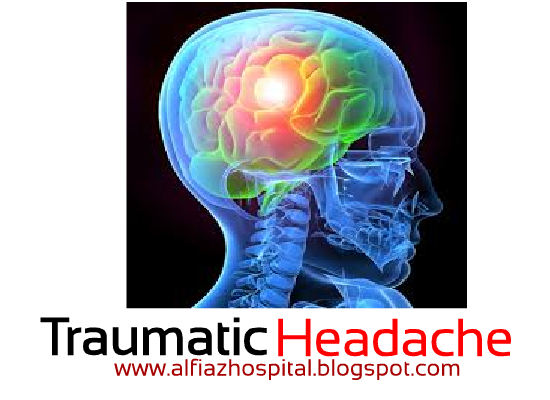Sign & Symptoms Of Traumatic Headache
Physical symptoms
- Loss of consciousness for a few seconds to a few minutes
- No loss of consciousness, but a state of being dazed, confused or disoriented
- Headache
- Nausea or vomiting
- Fatigue or drowsiness
- Difficulty sleeping
- Sleeping more than usual
- Dizziness or loss of balance
Sensory symptoms
- Sensory problems, such as blurred vision, ringing in the ears, a bad taste in the mouth or changes in the ability to smell
- Sensitivity to light or sound
Cognitive or mental symptoms
- Memory or concentration problems
- Mood changes or mood swings
- Feeling depressed or anxious Treatment

ight after a severe TBI, people may have headaches because of the surgery on their skulls or because they have small collections of blood or fluid inside the skull.
Headaches can also
TREATMENT The vast majority of individuals with post-traumatic headache may be treated as outpatients, and hospital admission for observation is rarely necessary. Symptomatic treatment may include non-steroidal anti-inflammatory medications, mild analgesics and/or muscle relaxants. Superficial heat, postural support, and exercise may be useful for cervicogenic headache. Individuals with migraine-type post-traumatic headaches may require tricyclic antidepressants or abortive medications (butalbital compounds such as fiorinal, Fioricet, Esgic, and phrenilin, ergots, sumatriptin, valproate, or intravenous dihydroergotamine). Individuals with chronic post-traumatic headaches may develop symptoms and signs including dizziness, vertigo, candidates, hearing loss, irritability, anxiety, depression, personality change, fatigue, sleep disturbance, decreased libido, and/or decreased appetite. These conditions and symptoms may require treatment by an appropriate specialist such as a psychiatrist or otolaryngologist.
Why are headaches a problem after brain injury?
Headaches after TBI can be long-lasting, coming and going even past one year. Headaches can make it hard for you to carry out daily activities or can cause you to have more difficulty thinking and remembering things.
Why do headaches happen after brain injury?
occur after mild to moderate injury or, in the case of severe TBI, after the initial healing has taken place. These headaches can be caused by a variety of conditions, including a change in the brain caused by the injury, neck and skull injuries that have not yet fully healed, tension and stress, or side effects from medication.

Post a Comment